Poking Around in Wonder
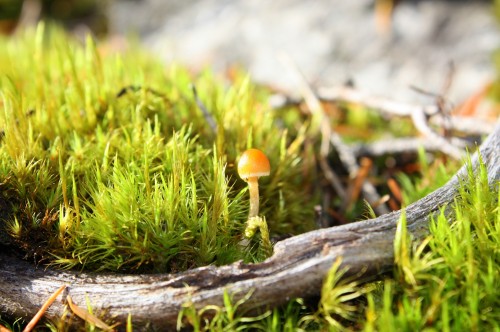
Last summer, during the first quarter of our graduate program, our professor John Miles had us read several excerpts by author Kathleen Dean Moore, a philosophy professor at Oregon State University. One of the first articles was “The Truth of the Barnacles: Rachel Carson and the Moral Significance of Wonder” from the journal Ethics & the Environment. The article was the perfect start to North Cascades Insitute’s M.Ed. in Environmental Education, as it gave us a perspective to view the art of naturalizing that we worked to perfect throughout the summer. One of my favorite quotes from the article was:
“Meanwhile, Earth turns, birds fly north or south, fish rise or sink in the currents, the moon spills light on snow or sand. And we, do we think we turn the crank that spins the Earth? A good dose of wonder, a night of roaring waves, a faceful of stars, the kick in the pants of an infinite universe, the huge unknowing these remind us that there is beauty that we didn’t create.”
Moonrise at Early Winters campground.
This “wonder” has become one of my most relied on tools the farther I progress in the residency portion of this graduate program. Although I have always loved spending time in nature, over the last seven months I have taken my “poking around” (to use a Moore phrase) to a whole new level. My sense of wonder constantly leads me on adventures, stalking bobcat tracks in the snow, trying to deduce how clumps of lichen seem to spontaneously grow in mid-air, and examining the miniature worlds of moss and mushrooms. This practice of wonder seems to be an exponential phenomenon, as the more time I spend exercising it, the more wondering I end up doing.
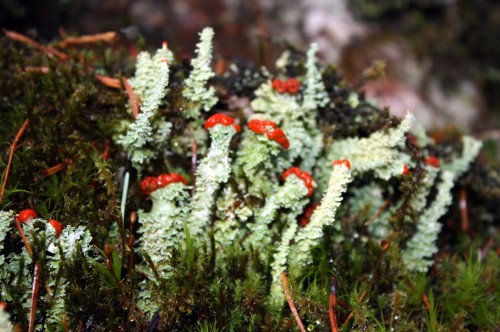
Lipstick caledonia on Pyramid Lake trail.
Witch’s butter fungus along a trail at the North Cascades Environmental Learning Center.
As a Mountain School instructor in the fall, I was constantly trying to pique my students’ own sense of wonder by having them be observational explorers. Any time a group member saw something “cool,” they were responsible for alerting the rest of the group and sharing their discovery. Giant explosions of fungi, bear scratches on a tree, and rocks lodged ten feet in the air by downed root bases often meant that we sped along trails at less than one mile per hour. Despite the fact that I traveled the same few trails every week, I was constantly noticing new aspects of the forest, which excited me as much as my students. This kind of wonder in childhood is so essential in fostering an ethic of stewardship in adulthood. As Rachel Carson said, “If a child is to keep alive his inborn sense of wonder, he needs the companionship of at least one adult who can share it, rediscovering with him the joy, excitement, and mystery of the world we live in.”
Mushroom near Bacon Creek.
One of my goals for the duration of my residency with North Cascades Institute is to become an expert at poking around, so that I know the landscape around the Learning Center as thoroughly as one can know a constantly changing environment. Moore writes that, “The whole point is that poking around is good in itself, like music, or moonrise.” Logic therefore dictates that it must make me a better person to spend a few hours killing time with my camera and sketchbook.
Flower head along Freezout Pass trail in the Methow Valley.
A few weeks ago, Kathleen Dean Moore happened to be speaking about her newest book, Moral Ground: Ethical Action for a Planet in Peril,at Bellingham’s Village Books, which was co-edited with Michael P. Nelson. Many members of cohorts nine and ten, as well as our Professor Miles, attended her talk. It was the perfect reminder for why all of us are in this program. The premise of Moral Ground is that we have a moral responsibility to the planet, for reasons including our survival, for the children, justice, and other species. Our anthropocentric “human exceptionalism,” the idea that humans are not subject to the rules that apply to all other organisms, is unacceptable, and illogical. The crux is that even if we are able to convince a majority of people that we do have an obligation to act responsibly, behaving responsibly is the essential, and often most challenging step.
However, I took hope from Moore’s talk, and look forward to reading the book. The positive energy in the room that night reminded me that it is the power of collective action to effect positive change that drives me. Moore said, “Our calling can be found at the intersection of our greatest joy and the world’s greatest need.” The natural world is my greatest joy, and through this program, I am working to address what I see as the world’s greatest need. The wonder that first led me to poke around in my backyard as a child still calls me outside to poke around on a sunny day; I only hope that I can plant the same desire in everyone that I meet.
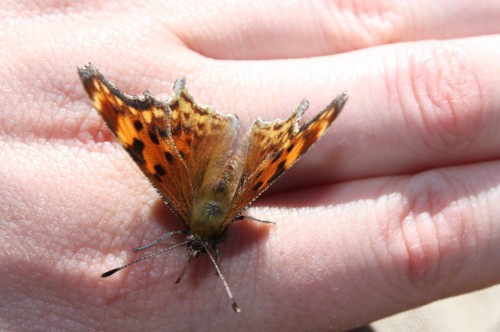


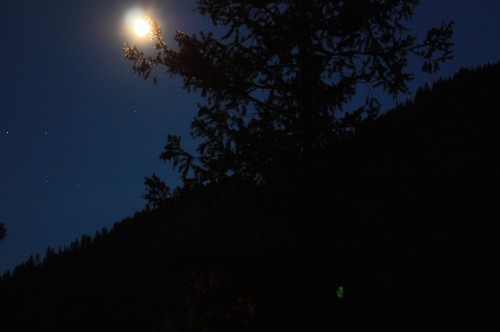
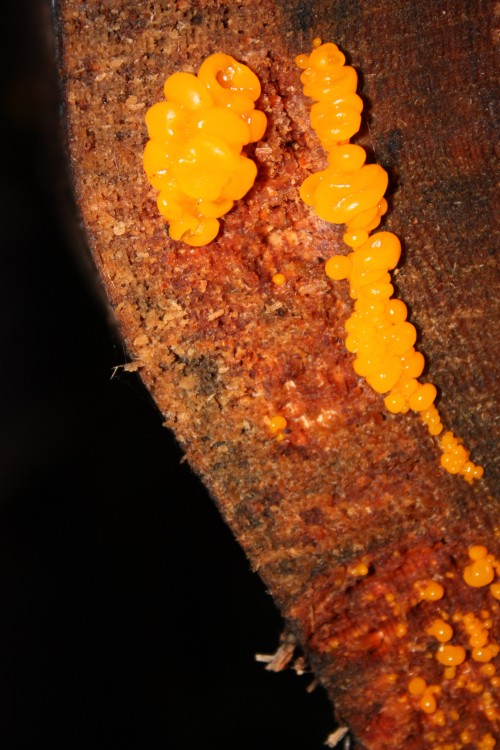
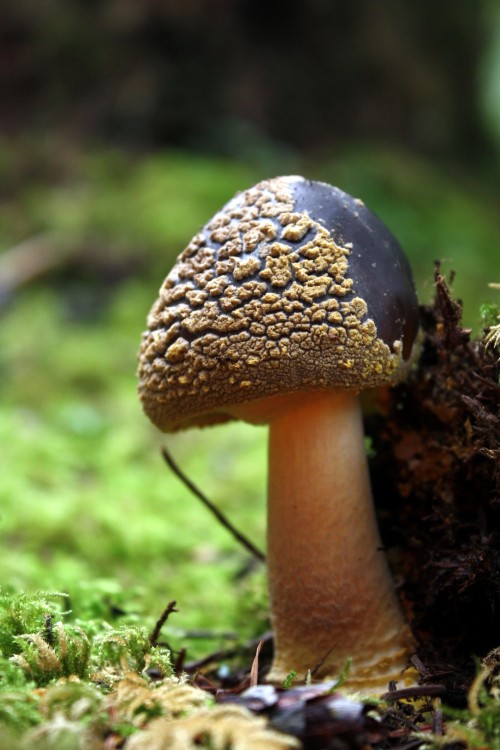
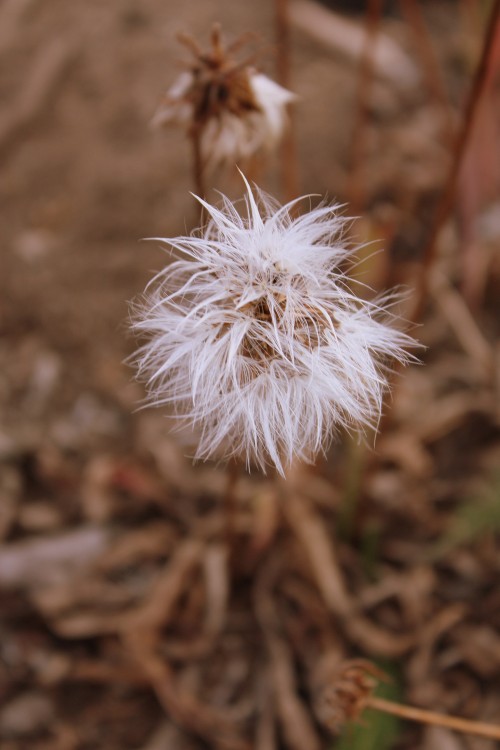
Nice job-enjoyed reading this and seeing your photos-good luck with your continued journey in a fabulous place.
Excellent – both the text and photos!
Re. “poking around”, you might enjoy reading “The Tracker” by Tom Brown, which I think is particularly eloquent on that topic.
What a wonderful post, Kate! I really enjoyed reading this reflection on your experiences so far.
Your passion and gifts of writing and photography will be great attractors to help others poke around and appreciate the natural world. I especially like the Bacon Crk mushroom picture.
Thanks for your kind words, Jack.
You definitely have found your calling-the combination of your passion and the dire need! Very descriptive writing and unique closeups-enjoyed the quotes. Enjoy the continuing story!
What a lovely essay. Good luck with your poking around, your education, and especially your teaching. I don’t think there is any more important work in the world.
I’m a little worried about the increasing number of X-rated outdoor photos that seem to be showing up in your ‘essays’, K8! 🙂 Jk!
‘By nature’ this is all very sensual stuff, and you have captured it beautifully both in word (‘poking’, ‘pondering’, ‘wondering’) and digital form.
Keep up the good work stimulating our thoughts, senses and passions!